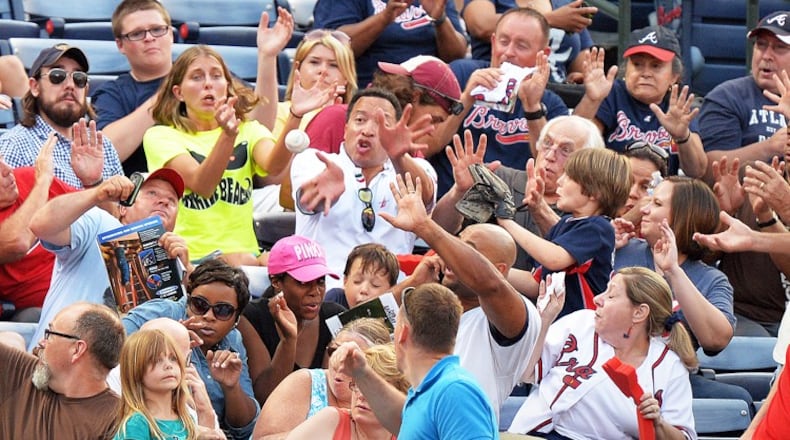A highly publicized lawsuit against the Atlanta Braves filed by the father of a 6-year-old girl whose skull was shattered by a foul ball has reached a settlement that awaits a judge’s final approval.
The lawsuit was filed in 2012 by Fred Fletcher, who was sitting with his daughter behind the visiting team's dugout at Turner Field on Aug. 30, 2010. In the fourth inning, Braves outfielder Melky Cabrera smacked a foul ball that struck the child in the head, fracturing her skull in 30 places and causing traumatic brain injury.
Fletcher later added Major League Baseball as a defendant, and his lawyers asked the league to turn over documents from its investigations of steroid use by players. The attorneys said they wanted the information to show jurors that juiced-up ballplayers hit balls harder, giving fans even less time to get out of the way of foul balls.
According to a recent court filing in Fulton County State Court, terms of the settlement between Fletcher and the Braves and MLB are confidential. The filing asks Judge Patsy Porter to approve the settlement and an irrevocable trust, which has been set up to manage the girl’s funds. It says that the girl’s medical bills have totaled $66,439.
A resolution would end years of protracted litigation that has included hours of pretrial depositions, flurries of court motions, a closely watched appeal, and massive amounts of documents being turned over in discovery.
The Braves initially sought to get the case dismissed by trying to persuade courts to recognize the so-called "Baseball Rule" as the law in Georgia. The rule, already in force in other states but not here, says if a stadium operator provides adequate screening behind home plate, and enough seats for spectators who want to sit there, it cannot be held liable for balls and bats that enter the stands and hurt people.
But both Porter and the Georgia Court of Appeals declined to invoke the rule, allowing the case to go forward.
In the settlement document, both the Braves and MLB contend they were not negligent and that the girl’s injury was not foreseeable. Atlanta Braves spokeswoman Beth Marshall said the club declined to comment on the case.
Fletcher’s lawyer, Mike Moran, also declined to comment on the settlement.
In previous court filings, Moran said the Braves and MLB were liable for the girl’s injury because they failed to erect enough safety netting even though they knew of the dangers to fans in areas behind the dugout. His filings also noted that during collective bargaining negotiations in 2007 between MLB and the players association, the union asked the league to extend netting further down the foul lines to provide more protection for fans. But MLB rejected the proposal, court filings said.
In recent years, after a spate of gruesome foul ball injuries suffered by fans, MLB encouraged clubs to extend protective netting.
In February, the Braves announced it was extending the netting behind home plate to the far end of both dugouts at SunTrust Park, the Braves’ new home in Cobb County. At Turner Field, the team’s home in Atlanta for 20 seasons, the screen extended only to the start of the dugouts.
“We believe that this net gives us the appropriate level of coverage for the most number of seats for this particular ballpark,” Braves president of business Derek Schiller said at the time.
On Thursday, Marshall, the Braves’ spokeswoman, said the team’s decision to expand the netting at SunTrust Park was unrelated to the foul ball lawsuit.
About the Author
The Latest
Featured




